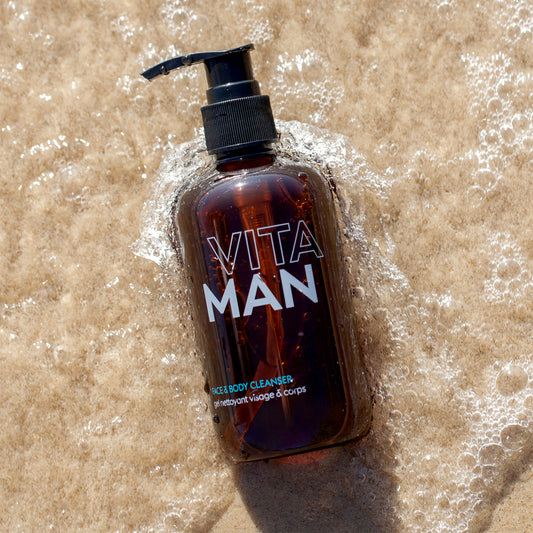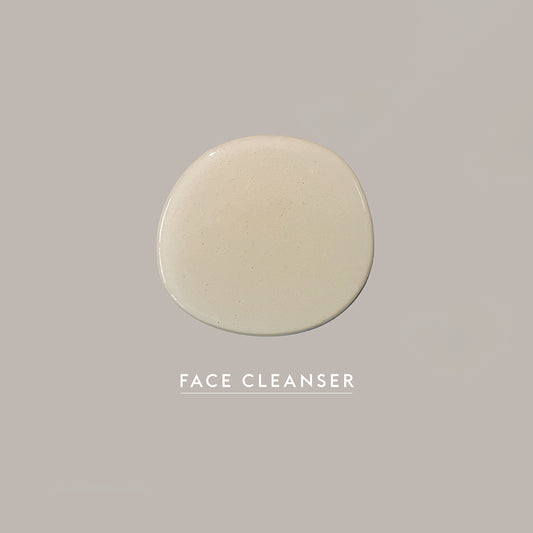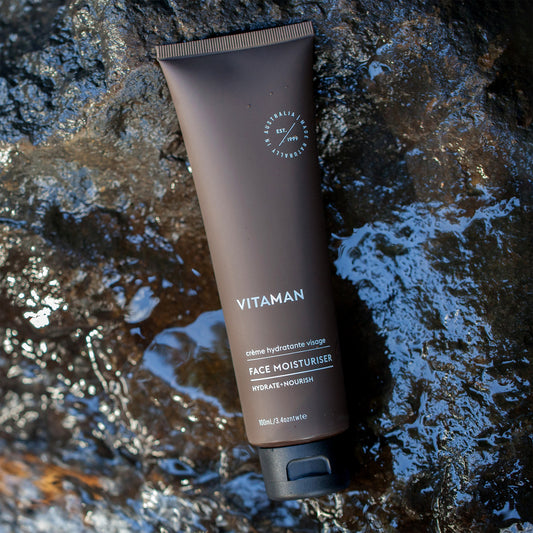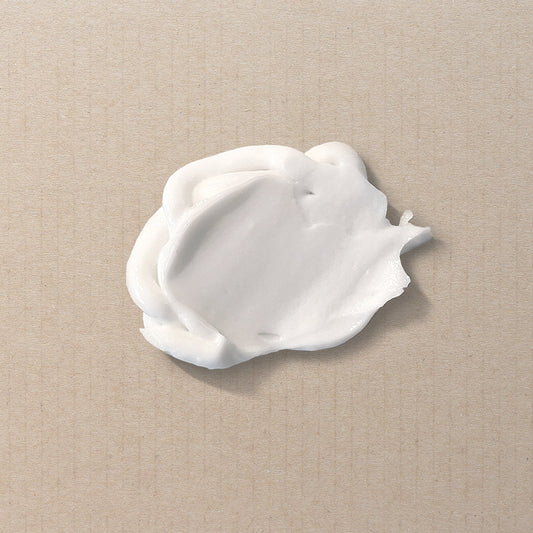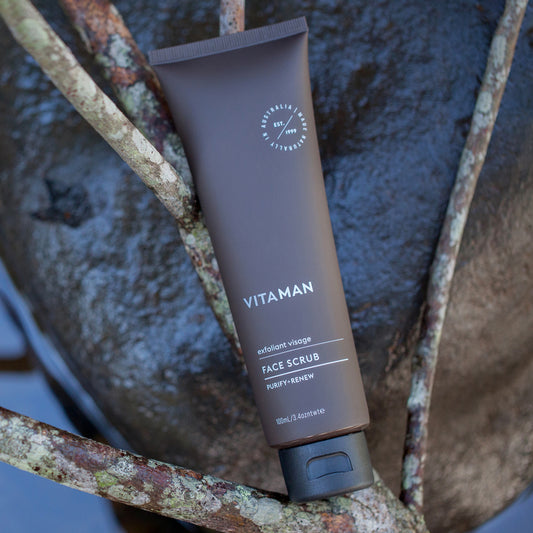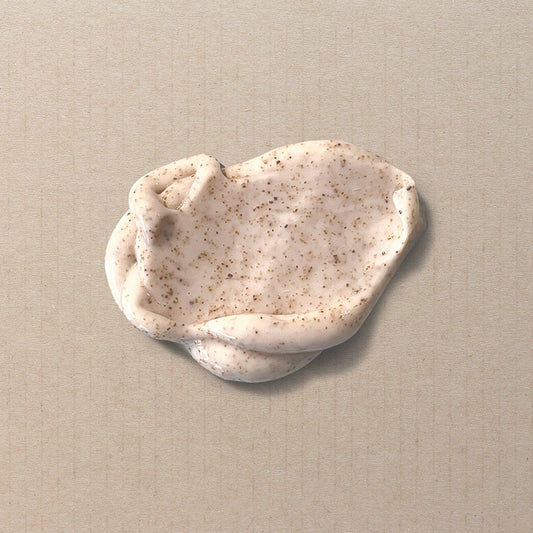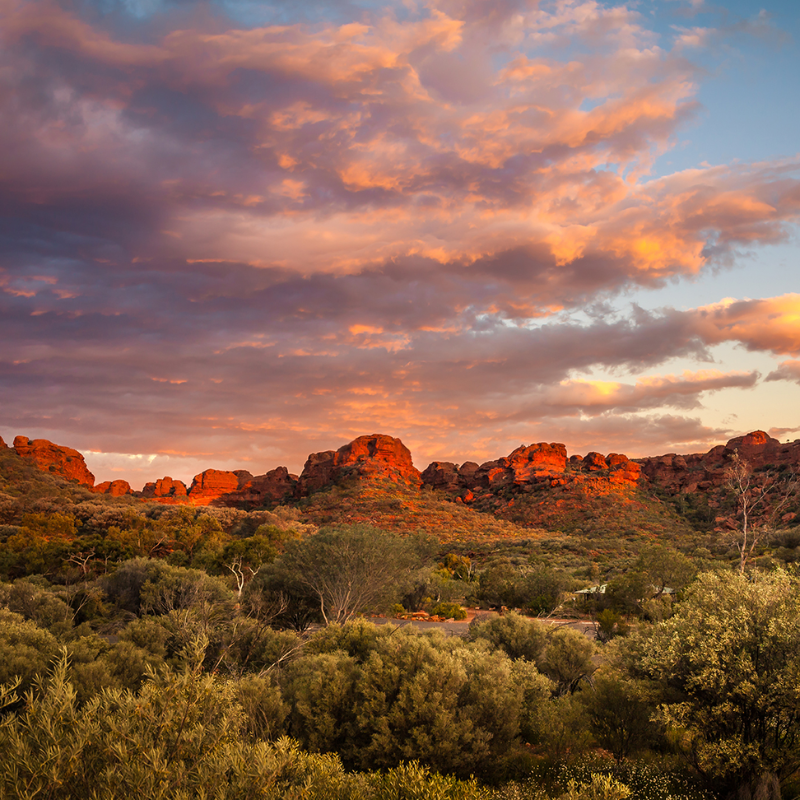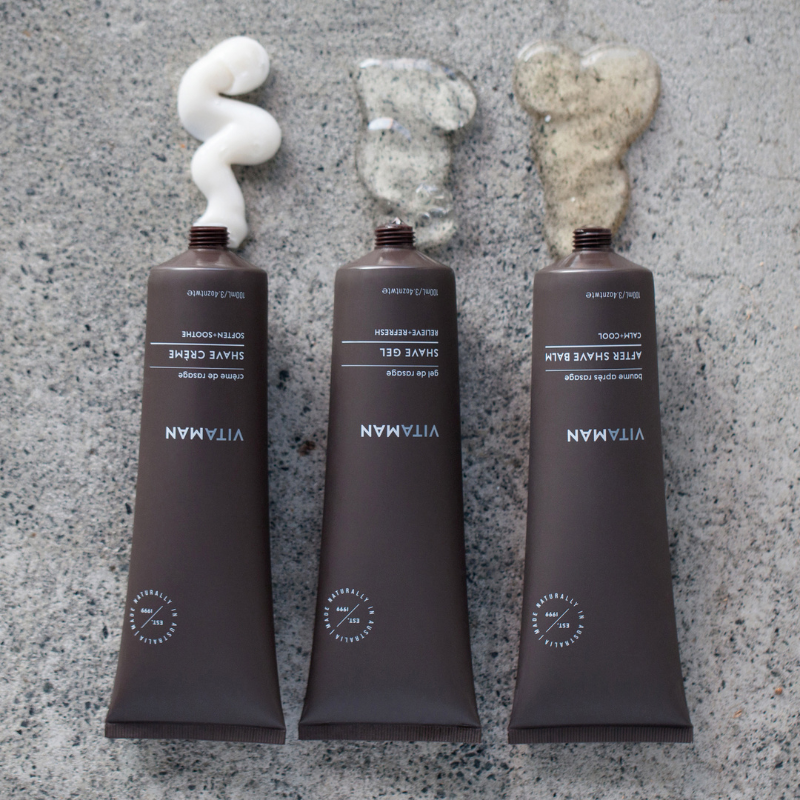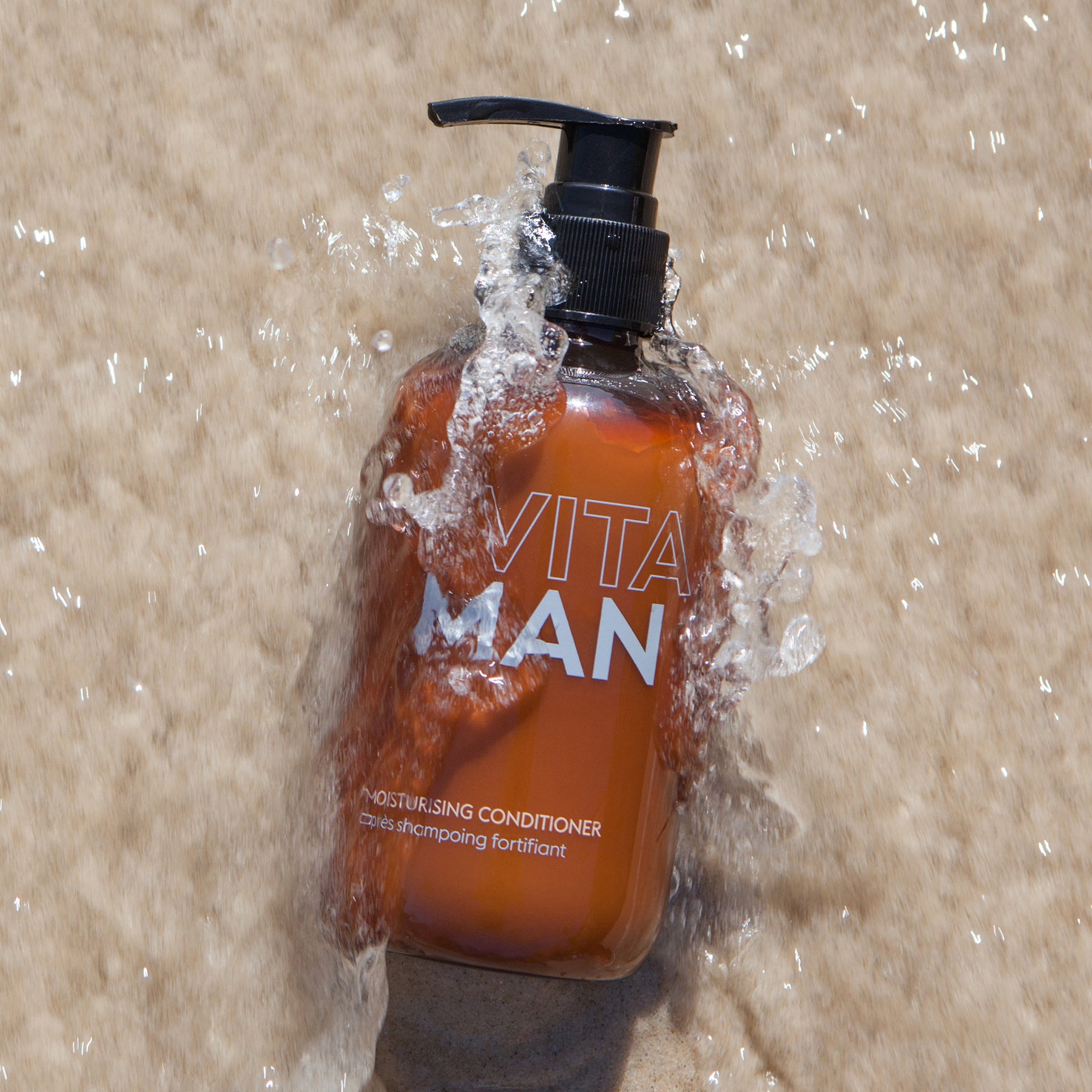Here’s something we can all agree on: Dry, flaky skin is a confidence killer. In fact, it’s a pain in the you know what!
Imagine having a date with the hottie from the coffee shop, an important presentation, or an important interview and all you can think about is the drought on your face.
Dry skin is unsightly, itchy, and irritating. It can also be incredibly uncomfortable - as anyone who’s had cracked lips in winter will attest to!
When it comes to dry skin, far too many men assume that the best they can do is force a smile and hope that no one else notices. Thankfully though, relief is at hand.
In this article, we show you how to treat men's dry skin once and for all. Let's start with the basics.

What are the symptoms of dry skin?
Dry skin can be temporary or a lifelong problem that affects any part of your body. Symptoms depend on where you live, your age, your genes, your diet, and how much time you spend outdoors.
The symptoms of dry skin include one or a combination of the following:
- Your skin feels tight after showering or swimming
- Your skin looks and feels rough
- Your skin is continuously itchy
- Your skin flakes, scales, or peels off
- You notice fine lines or cracks in your skin, which may bleed
- You notice redness on your skin
Here’s the good news: Most of the time, dry skin is not a sign of any serious conditions. Plus, it can be easily treated at home without much change to your weekly skincare routine.
With this being said, you should consult a dermatologist if:
- Your skin doesn't improve, no matter what you do
- Your dry skin interferes with sleeping
- Your skin becomes infected
- You have large areas of peeling, flaking, or scaling skin
What causes extremely dry, flaky skin?
Before getting to the nitty-gritty of treating men's dry skin, you first need to know what causes it. So, without further ado, here we go:
Dry, flaky skin is often caused by one or a combination of the following factors:
- Weather - Skin tends to be driest in winter when temperatures and humidity levels plummet (just another reason winter sucks). But the season may not matter as much if you live in desert regions
- Heat - Central heating, wood-burning stoves, space heaters, and fireplaces all reduce humidity and dry your skin
- Hot baths and showers - While a long, hot shower or bath is relaxing after a day on the tools, they can, unfortunately, strip your skin of its moisture and natural oils, leaving it dry and scaly
- Swimming - Chlorine may be great at killing bacteria but it's also handy at drying your skin out
- Soap - Many soaps, detergents, and shampoos strip moisture from your skin
- Underlying skin conditions - People with skin conditions such as atopic dermatitis (eczema) or psoriasis are prone to dry skin
Dry Skin Cause 1: The Weather
When it's cold outside, air humidity levels drop. This causes your skin to dry out quickly since there is no moisture in the air to assist in keeping your skin hydrated.
In the winter, your skin loses more than 25% of its natural ability to hold moisture, causing the water in your skin to evaporate more quickly and leaving you with - you guessed it - dry, flaky skin.
Conversely, hot weather makes you sweat, leading to dehydration, leaving your skin irritated and dry.
Dry Skin Cause 2: Hot baths or showers
Although taking a long, hot shower after a day's work might feel good - it's not so good for your skin (sorry to be a party pooper).
The outermost layer of your skin protects your skin's internal layers from harm and protects against moisture loss through evaporation. It does this using sebum oil which protects and lubricates your skin and acts as a waterproof barrier.
Hot water strips your skin of sebum, leaving you with wrinkly skin. Without this protective oil, your skin struggles to retain moisture, leaving it dry, flaky, and prone to irritation.
Dry Skin Cause 3: Swimming
As well as destroying germs and leaving your eyes red raw, chlorine strips your skin of sebum. This results in dry, itchy skin, especially for those unlucky enough to have sensitive skin.
Some chlorine elements can remain on your skin, even if you bathe or rinse off after leaving the pool.
Regular exposure to chlorine can cause a nasty condition known as 'chlorine rash’. In this case, your skin will need to be treated with over-the-counter products like hydrocortisone.

Dry Skin Cause 4: Soap
Most of us were introduced to soap as kids. And even though we associate soap with cleanliness and hygiene, it’s not exactly good for your skin. In fact, long-term use of soap can be bad for your health. Here's why:
- Soap kills good bacteria - Did you know there are both good and bad bacteria? Good bacteria eliminate harmful bacteria and protect you from microbes, which can cause disease. While soap is excellent at killing harmful bacteria, it also kills the good stuff - leaving you vulnerable to dangerous pathogens and microbes.
- Soap strips your skin of lipids - Lipids (aka fats) in your skin have three functions. They keep your skin soft and hydrated, they help protect it from disease, and they provide a protective barrier by filling in the gaps between your epidermal cells. Soap strips away these lipids, weakening your defense against organisms that can cause disease.
- Soap contains chemicals - Yep, you read that correctly. Your typical off-the-shelf soap includes any number of chemicals which can be dangerous. For example, sodium lauryl sulfate (SLS) is a known "mutagen" that can alter cellular materials. Benzyl acetate is a carcinogen linked to certain kinds of cancers and benzaldehyde can depress your nervous system.
Dry Skin Cause 5: Underlying skin conditions
- Contact dermatitis - An itchy, red rash caused by contact with a substance your skin is allergic to. When you contact something that causes a reaction, your skin develops a red, cracked, itchy rash, sometimes mistaken for eczema.
- Eczema - Skin that's chronically cracked, dry, scaly, and red. Unfortunately, this doesn't improve after using a moisturizer.
- Psoriasis - Thick, raised, red, or silvery patches of scaly skin often found on your elbows, knees, and scalp. Psoriasis occurs when your immune system goes into overdrive and rapidly creates new skin cells. This causes skin cells to pile up on your skin's surface.
How do I get rid of flaky skin?
There are several ways to rid yourself of dry, flaky skin - which we will detail below. Best of all, these solutions are painless and have no significant effect on your day-to-day life.
Remember to consult a dermatologist if nothing you try seems to be working.
How to treat men's dry skin:
- Stay hydrated
- Cover up
- Get a humidifier
- Learn to shower the right way
- Exfoliate (2-3 times weekly)
- Moisturize daily
- Ditch the soap!
How to treat men's dry skin 1: Stay hydrated
You’ve no doubt heard the benefits of consuming enough water. But did you know that the human body is 70% water? It is no wonder that drinking water is the answer to many of the issues we have with our bodies.
Dry and flaky skin is primarily an issue with water leaving the skin. Having a regular intake of 8 cups of water per day will ensure your body has enough liquid in your system to replenish the moisture lost through evaporation.
How to treat dry skin 2: Cover up
If the weather outside is cold and windy, you need to be wearing the appropriate clothing not just to stay warm but to protect your skin as well.
If the weather is particularly frosty, a scarf and hat will keep your face protected from the cold breeze slamming against your face. Likewise, don't expose your skin to the sun.
While you might be fond of a tan, the fact is sun-damaged skin looks dry, wrinkled, and leathery. Sun damage not only makes you look older, but it can also lead to skin cancer.
How to treat men's dry skin 3: Get a humidifier
A simple humidifier in your room or office can make a world of difference when it comes to getting rid of dry, flaky skin.
The added moisture in the air slows down the evaporation of water from your skin, keeping you healthy and hydrated.
How to treat men's dry skin 4: Learn to shower the right way
Try to avoid ultra-hot water when showering. Instead, use warm water and try to limit the amount of time showering. Warm water is less likely to strip your skin of its natural oils.
How to treat men's dry skin 5: Exfoliate (2-3 times weekly)
If you’re not regularly exfoliating, it’s time you upped your skincare game. Exfoliation is the best way to remove flaky skin from your body. This process allows your skin to absorb nutrients that increase blood circulation, giving your face a radiant, healthy glow.
As you age, your skin cells take longer to regenerate. If you don't remove dead skin cells regularly, you can find yourself with acne, blackheads, ingrown hairs, pimples, wrinkles, and of course - dry, flaky skin.
Deep cleaning your pores leaves you with smooth, healthy, youthful skin.
Avoid exfoliators that use plastic microbeads (these are bad for your skin and the environment) and opt for men's face scrub using natural ingredients like finely crushed walnut shells and bamboo powder to remove rough skin and dead skin cells gently.
How to treat men's dry skin 6: Moisturize daily
Moisturizer works in two ways: It replenishes moisture in the outer layer of skin, preventing water from evaporating.
The best time to apply a moisturizer is immediately after showering. Using a moisturizer at this time traps the most moisture in your skin, keeping your skin healthy and saturated.
How to treat men's dry skin 7: Ditch the soap!
If you take one thing from this article - throw that soap away. Seriously, it’s doing more harm than good!
What can I use on my face instead of soap?
To prevent the harmful chemicals in regular soaps from damaging your skin, use a natural face and body cleanser instead. Look for ingredients like:
- Aloe Vera Leaf Juice – Aloe’s nourishing properties promote minor wound, burn and rash healing. Plus, it’s an excellent moisturizer and emollient.
- White Tea Leaf Extract - Studies have shown that white tea has an anti-inflammatory effect on the skin and can strengthen and protect the skin matrix.
- Witch Hazel - An excellent natural alternative to alcohol. It's anti-bacterial, which makes it perfect for cuts and nicks. It will also soothe your skin and won’t leave you with inflammation after shaving
- Chamomile Flower Extract - Has soothing, healing, and anti-inflammatory properties that cool and calm sensitive skin.
What are the benefits of natural products?
When dealing when dry, flaky skin, you don't want to make the problem worse than it already is. Unfortunately, many of the products you'll find at your local grocery store do exactly that!
Before making your final purpose, look at the ingredient list to make sure you are selecting products with natural ingredients.
What ingredients are bad in skincare?
- Mineral oil
- Polyethylene Glycol
- Propylene Glycol
- Aluminium
- Alcohol
- Synthetic Fragrances
Mineral oil
Mineral oil is a petroleum by-product that clogs your pores, damages your skin, and can lead to acne outbreaks.
Polyethylene Glycol
Added to moisturizers as a thickener, polyethylene glycol also reduces your skin's natural moisture retention ability - causing it to dry out faster.
Propylene Glycol
The Toxic Substance & Disease Registry agency suggests that propylene glycol can lead to skin irritation. This chemical is definitely not suitable for people who have dry or sensitive skin.
Aluminium
Aluminium is a toxic metal that disrupts the endocrine system and can be found in cheap (and not so cheap) deodorants.
Alcohol
While alcohol is great in beer, you want to avoid it in skincare products. Alcohol breaks down skin cells and dries them out quickly. The benefit of alcohol in skin products is to dry the product quickly; however, this also negatively affects the skin, ultimately causing dryness and flakiness.
Synthetic Fragrances
Fragrances make whatever product you are using smell refreshing. However, for someone dealing with dry or sensitive skin, this can be an irritation that can lead to rashes, itching, and burning.
How can I hydrate my skin naturally?
- Aloe Vera Leaf Juice
- Shea Butter
- Kakadu Plum Extract
- White Tea Leaf Extract
- Aloe Vera Leaf Juice
Shea Butter
Shea butter is extracted from the shea nut, which is great for moisturizing skin. It contains high concentrations of fatty acids and vitamins that soften the skin.
Significantly, shea butter accelerates cell renewal and repairs the hydrolipidic film, making your skin retain optimal moisture levels.
Kakadu Plum Extract
Kakadu plums contain 100 times more vitamin C than an orange! This makes them an amazing natural source for collagen synthesis, iron absorption, and heart health.
White Tea Leaf Extract
White tea has an anti-inflammatory effect on the skin, making this another excellent choice for sensitive skin.
White tea also provides partial UV protection, defending your skin from harmful damage caused by the sun.
What can I do for extremely dry skin?
We've shown you the causes of dry skin, what to avoid, and what to do if you're looking to banish those flakes and itches for good. You should now be on your way to healthier skin that makes you look your handsome best!
If you're searching for a natural way to treat dry, flaky skin quickly, look no further than our Natural Men's Face Moisturizer and Natural Men's Body Moisturizer. These vegan certified skincare essentials are made with organic ingredients sourced from our own laboratory - the Australian outback.
We never use alcohol or soap (if you haven’t already realized, we hate soap). Instead, you'll find ingredients proven to keep your skin healthy and hydrated, like coconut oil, Kakadu plum extract, white tea leaf extract, and shea butter.
For clear, firmer skin that looks younger and healthier, our moisturizers are just the (natural) tonic you need.





